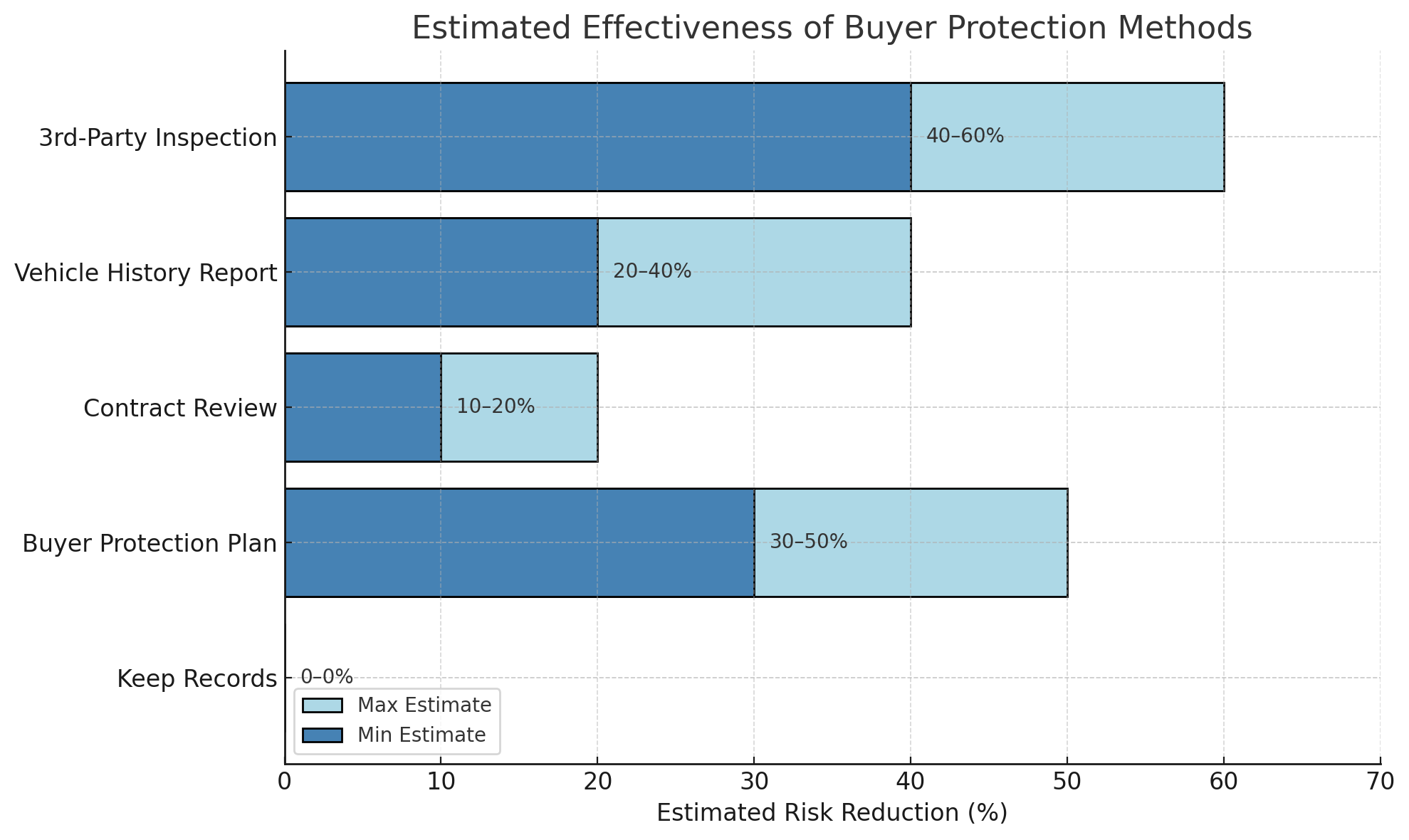Contents
AutobidMaster and Copart both sell salvage and used vehicles through online auctions, but they serve different types of buyers. Copart is a wholesale auction platform for licensed dealers, while AutobidMaster acts as a broker, giving the public access to Copart’s inventory. The vehicles are the same, but the buying process, fees, support, and legal protections differ. This guide breaks down those differences so you can choose the safer, more cost-effective way to buy.
The U.S. sells over 3 million salvaged vehicles at auction annually, according to industry estimates.
What Is Copart and Who Can Use It
Copart is a global auction platform that sells vehicle inventory from insurers, banks, rental fleets, and dealers. It’s best known for Copart auctions featuring salvaged vehicles, clean vehicles, and parts-only units. Many customers come for the sheer choice and Copart’s extensive inventory across hundreds of locations.
Some states require a dealer’s license to buy directly at Copart. Where a license isn’t required, public buyers can still join, but certain categories or vehicle types may be restricted. You can bid on vehicles via online auctions, preview vehicle condition notes, and arrange pickup.
Who typically uses Copart:
- Licensed dealers need unrestricted buyers’ access.
- Body shops searching for damaged vehicles or rebuildable units.
- Exporters and international customers arranging shipping.
- DIY rebuilders looking for affordable vehicles.
- Parts businesses that purchase vehicles for dismantling.
Copart is attractive if you want a direct relationship with the source and are comfortable navigating fees and logistics yourself.
Copart reports millions of auction lots processed yearly worldwide, reflecting strong demand for salvage remarketing.
What Is AutoBidMaster and How It Works
AutobidMaster is a licensed broker that gives public buyers access to Copart auctions without needing their own dealer license. Think of it as an intermediary platform that provides options like simplified registration, a user-friendly interface, and extra help with vehicle pickup and international shipping options.
Here’s how AutobidMaster works in practice: you sign up, choose a membership level, start bidding in online auctions, and let the broker handle the auction process details with Copart. The platform emphasizes key features like vehicle reports, VIN checks, and customer support.
What AutobidMaster offers:
- Membership levels allowing users to join without a personal dealer license.
- A user-friendly dashboard with real-time bidding.
- Access to a wide range of vehicles and a wide selection of filters.
- Optional services: title handling and delivery.
- Tools like vehicle condition reports, VIN decoder, and vehicle history reports.
- Mobile convenience through the AutobidMaster app.
If you’re not licensed, AutobidMaster can offer access and help you make an informed decision with added guidance and vehicle data.
Key Differences Between AutoBidMaster and Copart
Copart sells directly and may require an auction license for dealers. AutobidMaster brokers access, adds support, key features, and logistics options, plus tools that simplify research, fees, and delivery.
Auction Access, Bidding & Vehicle Selection

Direct Copart accounts can be public or business, but some vehicle categories need a dealer license. AutobidMaster acts as the broker, allowing users without licenses to join Copart auctions. Both platforms run online auctions with pre-bidding and live bidding. Selection is massive, from daily drivers to hard-to-find vehicles, including occasional relists of unsold auction cars. Search filters help you narrow by desired location, make, model, mileage, and damage type.
AutobidMaster emphasizes a user-friendly interface and a straightforward bidding process. Copart offers advanced tools for experienced customers who want direct control. In both cases, you can preview images and condition reports before placing a bid.
| Feature | Copart | AutobidMaster |
| Who can join | Public in many states; some categories need a dealer license | Public buyers via broker; no personal dealer license needed |
| How to bid | Pre-bid + live bidding process | Pre-bid + live bidding process through broker |
| Selection | Copart’s extensive inventory across the U.S. | Access to Copart’s large inventory via a broker |
| Research tools | Photos, condition reports, basic data | Photos, vehicle reports, VIN checks, vehicle history reports |
| Interface | User-oriented | Convenient interface with guided steps |
Both paths let you bid on vehicles across a wide range of vehicles, including cars, trucks, and motorcycles.
Membership Options and Buyer Fees
Copart accounts may be free to open, but certain activities can require upgrades, and you’ll see additional fees tied to bidding privileges. AutobidMaster uses clearly defined levels, each with key features such as bidding limits and access to extra services. When comparing membership fees and membership costs, look at the entire fee stack: transaction and auction fees, as well as optional services.
AutobidMaster publishes its membership costs, while Copart details fees per auction and vehicle purchase. Remember, brokers add value but also collect revenue. Understand how AutobidMaster charges appear alongside Copart’s own line items.
| Item | Copart | AutobidMaster |
| Account type | Public/Business | Membership levels with a tiered membership fee |
| Buyer fees | Copart transaction and auction fees | Broker transaction fees, AutobidMaster fees, plus Copart line items |
| Visibility | Fee tables by auction region | Transparent dashboard summaries |
| Add-ons | Storage, gate, and additional fees | Title handling, shipping, and delivery options |
| Notable | Direct seller connection | Broker support and AutobidMaster offers (tools, guidance) |
Always total the final bid price plus additional fees before committing to a vehicle purchase.
Title Transfer, Export & Delivery Services

Winning is only half the job. You still need title processing, pickup, and shipping. Copart provides standard release and storage logistics; you coordinate carriers or export on your own. AutobidMaster extends services for title transfer, domestic delivery, and shipping. This can be crucial for international buyers who want a smoother workflow from vehicle pickup to port.
Both routes require accurate paperwork for titled vehicles. Exporters must check destination rules and timelines. Delivery costs vary by desired location, distance, vehicle size, and carrier availability.
| Task | Copart | AutobidMaster |
| Title processing | Standard procedures | Guided help with the title vehicles |
| Domestic delivery | Third-party carriers | Arranged assistance with the broker’s help |
| Export & international shipping | You coordinate | Assisted with international shipping and documents |
| Scheduling | Yard rules apply | Broker coordination with yards and carriers |
| Support | Yard & self-service | Broker team + convenient portal |
Broker services reduce friction, but verify timelines to avoid additional storage fees.
Customer Feedback and Ratings
User sentiment highlights simplicity versus control. AutobidMaster earns praise for guidance and tools; Copart draws respect for scale and speed. Read both AutobidMaster reviews and Copart feedback carefully.
AutoBidMaster Reviews
AutoBidMaster appeals to a wide range of buyers, from casual shoppers to high-volume resellers, each with different priorities. Based on recent user feedback, here’s what stands out:
Pros:
- Some buyers say they’ve purchased 30+ vehicles over the years with mostly good results.
- Many buyers highlight support reps for being responsive and genuinely helpful throughout the process.
- Most users find it easy to bid, upload documents, and arrange delivery.
- In states where licenses aren’t accepted, clients still get access to auctions.
- Shipping is often fast and professional, with polite drivers.
Cons:
- Some buyers waited months for their title, with little explanation or updates.
- Membership, dealer, and shipping fees feel inflated to many users.
- If issues come up post-sale, some buyers feel left on their own.
- A few buyers received cars labeled “clean” that turned out to be salvage.
- Buyers can’t arrange their own transport, and many believe prices are marked up.
Copart Reviews
Whether you’re selling a wrecked vehicle or bidding on salvage inventory, Copart dominates the U.S. auto auction space. But behind the scale and reach, reviews reveal a sharp divide between smooth drop-offs and frustrating buyer experiences.
Pros:
- A few sellers say the pickup, payment, and paperwork process went quickly and without issues.
- Some visitors mention polite, helpful employees at local yards, especially during personal property retrievals.
- Many sellers received funds within hours after accepting an offer for their totaled cars.
- Walk-ins with titles or paperwork often describe the check-in process as fast and coordinated.
- Users praised staff for being kind to the elderly and offering small courtesies.
Cons:
- Many buyers feel misled by extra charges after the sale, especially for pickup.
- Some users claim bids are artificially inflated or canceled when prices don’t reach the targets.
- Buyers report missing or misleading photos, with hidden damage not disclosed.
- Several sellers describe checks that bounced, delayed titles, or vehicles taken without proper payout.
- Some users say Copart only prioritizes large-volume buyers.
SCA independent analyses suggest buyers who review multiple vehicle photos and reports reduce post-purchase issues by 20–30%.
Pros and Cons of Using a Broker vs Going Direct
If you lack a dealer license, a broker is the simplest path to Copart auctions. Even licensed buyers may prefer a broker for shipping and paperwork help. Going direct gives you full control and may reduce some transaction costs, but you’ll manage more steps.
Consider your comfort with research, yard rules, timelines, and auction math. Brokers add services, tools, and support; direct can mean fewer intermediaries.
| Aspect | Broker (AutobidMaster) | Direct (Copart) |
| License need | None; broker offers access | Often, a dealer license for some categories |
| Tools | AutobidMaster offers key features, reports, and VIN checks | Platform-native tools, strong for power users |
| Fees | Broker transaction fees + fees | Copart transaction fees, fewer broker line items |
| Logistics | Title & shipping options available | You coordinate carriers/export |
| Learning curve | User friendly | Steeper; high autonomy |
Pick based on how much help you want from bid to delivery.
Legal Considerations and Buyer Protections
Always review your state’s rules for title vehicles, salvage inspections, and emissions. Some states allow you to register salvaged vehicles after repairs and inspection; others restrict road use. If you’re exporting, confirm international shipping documents and customs requirements. Read each auction’s terms, including additional fees, storage deadlines, and final bid price payment windows.
Request reports to understand structural or flood issues. When possible, arrange a physical inspection or third-party review to inspect the car before committing. Keep records of your purchase, communications, and receipts to protect your rights if disputes arise.
Here’s a visual chart showing the estimated effectiveness of various buyer protection methods in reducing post-sale issues.

The “As-Is, Where-Is” Clause
Vehicles sold on Copart and through AutoBidMaster are typically offered under an “As-Is, Where-Is” clause. This means the vehicle is sold in its current condition, with all faults, and without any guarantees or warranties. Buyers accept the risk of undisclosed damage, missing parts, or mechanical issues and cannot request refunds after the sale is finalized. It’s essential to review inspection reports, photos, and available documentation before bidding, as no post-sale adjustments will be made.

What to Do If You Don’t Get the Title
Sometimes a vehicle’s documents are delayed because of lien releases, seller processing, or mailing issues. Stay proactive. Confirm what the sale terms promised for the title vehicles and the expected timeline. Communicate with the yard or broker, and record every step. If you’re exporting, coordinate with your freight forwarder to avoid port delays.
Steps to take:
- Check the sale terms to confirm the promised title type and delivery window.
- Open a support ticket with Copart or AutobidMaster and provide your lot and vehicle details.
- Ask for tracking updates and any missing signatures or forms.
- If needed, request a bonded title or alternative remedies where legal.
- Keep all emails, invoices, and vehicle purchase receipts for proof.
- Escalate per the dispute procedure in the auction terms if deadlines pass.
Most issues resolve with steady follow-up and documented communication.
Can You Use Both Platforms at the Same Time?
Yes. Many buyers keep a Copart account while also using AutobidMaster. You might hunt hard to find vehicles in one and simpler services in the other. A broker can streamline auction steps when you’re short on time, while direct access lets you move fast on familiar lots. Balancing both widens your wide range of vehicles and deal flow, especially across multiple states. Just track transaction costs, membership fee differences, and final price totals carefully. Using both is smart if you want flexibility, broader coverage, and a mix of control and support.
SCA Auction: Alternative to Copart and AutoBidMaster
If you want another route, SCA is a platform similar to AutobidMaster that connects buyers to vehicle auctions and is often mentioned among Copart competitors. It focuses on user-friendly tools and options that help newcomers. You’ll see key features like simple search, clear fees, and optional shipping support. SCA can be helpful if you compare AutobidMaster vs Copart and want a third option before you purchase vehicles. It’s another way to reach salvage and clean title vehicles without your own dealer license.
Why some buyers try SCA:
- Broker access without a personal license.
- Streamlined interface and online auctions.
- Transparent auction and transaction costs.
- Optional delivery and export options.
- Good coverage of motorcycles, trucks, and cars.
Test multiple brokers to see which workflow fits you best.
Summary
You can absolutely compare Copart vs AutobidMaster side-by-side. Copart provides direct access to one of the largest vehicle marketplaces, while AutobidMaster brokers buyers in with guidance, tools, and shipping options. If you lack a dealer license, the broker path is easiest. If you want full control, go directly and study the fee tables closely. Always check photos, condition reports, vehicle notes, and the car’s history. Confirm membership costs, transaction fees, and the final bid price before paying. Whether you choose Copart, AutobidMaster, or both, plan logistics early and keep records. Doing your homework leads to safer vehicle purchase decisions and smoother delivery.
FAQ
What Happens to My AutobidMaster Membership if Copart Changes Its Buyer Rules?
If Copart updates eligibility or category access, your broker membership remains active, and the broker relays any changes that affect your bidding.
– AutobidMaster will notify buyers about new requirements.
– If a dealer license becomes needed for a category, the broker will outline alternatives.
– You can adjust membership levels or limits as needed.
– Expect updates on transaction costs, timelines, or storage rules.
– AutobidMaster offers guidance to keep your account compliant.
Does AutobidMaster Offer Temporary Bidding Access?
Yes. Short-term access is often available through specific levels, allowing users to join vehicle auctions without a personal dealer license. Check terms, bidding limits, and additional fees before you bid.
Can I Register a Salvage Title Car in My State After Buying It at Auction?
Often, yes, after repairs and inspection. Rules vary by state. Verify rebuild steps, safety checks, and emissions before your vehicle purchase. Keep documents, vehicle condition photos, and reports to support registration.
What’s the Difference Between Pre-Bid and Live Auction?
Pre-bid lets you place a maximum before the sale starts, and the system proxies your amount. It’s useful if you can’t attend or want to cap your budget.
A live auction is where real-time bidding happens. Prices can rise quickly, so know your ceiling, including taxes, additional fees, and confirm the final price before winning.
How Do Auction Extensions Work When Bidding Is Closed?
If a late bid arrives, many sales extend briefly so all customers can respond. Watch the countdown, as multiple extensions may occur. Factor in transaction fees, pickup timing, and storage to avoid rushed decisions.





